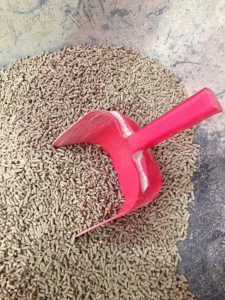
First, make sure you rule out underlying issues that could be keeping your horse from gaining weight. Poor teeth are a common problem in older horses. Make sure you are getting your horses’ teeth floated once or twice a year and always do a check yourself to make sure there are not any sharp points on their teeth if you are suspicious that they are experiencing mouth pain. Also, your worming program needs to be up to date. Make sure you are giving your horses a wormer that your veterinarian recommends. This could change based on everyone’s different geographical locations. Aside from teeth and worming…one of the biggest health issues that could hinder weight gain is ulcers. Ulcers will cause the horse to have a lack of appetite and be ill tempered due to pain. This happens more commonly with horses kept in stalls that do not have access to walking around on pasture and grazing for at least a portion of the day. It is also prevalent in competition horses that experience stress from travel and competing at a high level. Make sure that if your horse acts like he or she might have ulcers, to consult your veterinarian and get them on medication to alleviate this. Also, free choice hay helps greatly with ulcers, and should really be a management practice already in place for all of your horses. The horse naturally needs consistent fiber going through its digestive system to buffer the gut. Horses produce acid in the stomach all the time, not just when they eat. So when their stomach is empty, acid is still present and can cause ulcers if there is not roughage running through digestive system.
So after you have checked into underlying health and management issues and your horses still isn’t gaining weight what can you do? First, Make sure they have access to fee choice forage. Also, you can start to add some alfalfa to their forage to increase their caloric intake from a safe source. Adding Alfalfa will increase their protein intake, which will help with building muscle, and will increase their calorie intake, as it is more energy dense than grass hay. If a horse will not clean up all of its hay, introducing hay cubes can sometimes work. Alfalfa is also very palatable, so if you have a picky eater, usually they will take to Alfalfa pretty well.
The last part of adjusting a feeding program is if all of the above mentioned methods do not provide results, start looking into the concentrates being fed. When selecting a grain, make sure to look for a higher fat product (between 6-10%). Fat allows for you to add calories without too much volume, which is important for the horse. Their stomach is small compared to the rest of their digestive system, so food passes through there very quickly. You do not want the large intestine to get overloaded with undigested starch, because this is what often leads to colic and laminitis. So by feeding something higher in fat, you lessen the risk of overload because you do not have to feed as much. It is like choosing a small handful of nuts over a bowl of cereal…you might be getting the same calories, but in a much different amount! Adding fat can be in the form of purchasing a higher fat feed or adding rice bran or oil to your horse’s ration. Remember to add all changes to a horse’s diet slowly as to not upset the microbes in large intestine. Another good point about feeding added fat is that it often provides a slow burn type of energy that does not cause extra
excitability…it can actually improve behavior instead!
Whether you are dealing with a health issue or simply a hard keeper, following these tips and guidelines will help in achieving the desired weight gain. At the end of the day, weight gain is about calorie intake. We as horse owners just have to figure out how to get those calories back into your horse and why they might not be enough at the current rate being given. Make sure to also utilize your feed company’s equine nutritionist and you should be on your way to having a happy and healthy animal that is at a good weight and thriving.

165 North Clay Street
Louisville, Kentucky 40202
Kentucky website design & hosting by Envy Interactive.